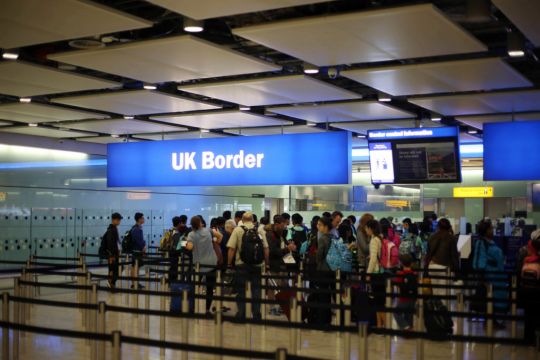The British government is set to follow other countries by requiring travellers from China to be tested for Covid-19 from early next year.
From January 5th, travellers from China into England will be required to show a negative Covid-19 test before departing in a move described as “balanced and precautionary” by the UK government.
The plan will sees the British overnment fall in behind the US and several other countries by introducing mandatory testing for travellers from China, amid concerns about surging case numbers in the Asian country.
Britain's Department of Health stressed the new measures, which include plans for surveillance testing of a sample of passengers arriving into England, would be kept under “regular review”.
Concerns have grown in recent days about surging case numbers in China, as Beijing announced plans to start reissuing passports and visas for overseas trips.
The British government said that China had failed to fully share information on the situation there, as cases soared after it relaxed its tough Covid-19 restrictions.
Responsibility will lie with airlines to check passengers’ negative tests, the Department of Health said.
“As Covid cases in China rise ahead of them reopening their borders next week, it is right for us to take a balanced and precautionary approach by announcing these temporary measures while we assess the data,” Britain's health secretary Steve Barclay said.
“This allows our world-leading scientists at the UK Health Security Agency to gain rapid insight into potential new variants circulating in China.”
Alongside the US, India, Italy, South Korea and Taiwan have all set out plans to require visitors from China to be tested for the virus.
Some Tory MPs had been calling for a more robust response from the British government, even as some experts had questioned the usefulness of such restrictions.
Under the new rules, the Covid-19 test will need to have been taken no more than two days before departure.
Professor Sir Andrew Pollard, chairman of the Joint Committee on Vaccination and Immunisation, said on Friday morning: “Trying to ban a virus by adjusting what we do with travel has already been shown not to work very well. We have seen that with the bans on travel from various countries during the pandemic.”

He told the BBC Radio 4 Today programme: “The important thing is that we have surveillance that when a virus is spreading within our population here in the UK or Europe we are able to pick that up and predict what might happen with the health systems, and particularly the more vulnerable in the population.”
The UK Health Security Agency (HSA) will carry out the surveillance testing from January 8th.
The HSA chief medical adviser Professor Susan Hopkins said staff would continue to monitor the spread of any new Covid-19 variants.
“The evidence suggests the recent rise in cases in China is due to low natural immunity and lower vaccine uptake including boosters rather than the emergence of new Covid-19 variants – unlike in the UK where vaccines are maintaining high population protection,” she said.
“In order to improve our intelligence, we are enhancing our surveillance, in addition to our current routine testing protocol.”
There are no direct flights from China to Scotland, Wales or Northern Ireland, but the British government said it would be working with the devolved administrations to ensure measures are implemented across the UK.
The Department of Health said that the volume of passengers arriving from China remains low, as it stressed that the best protection against Covid-19 remained getting vaccinated.







